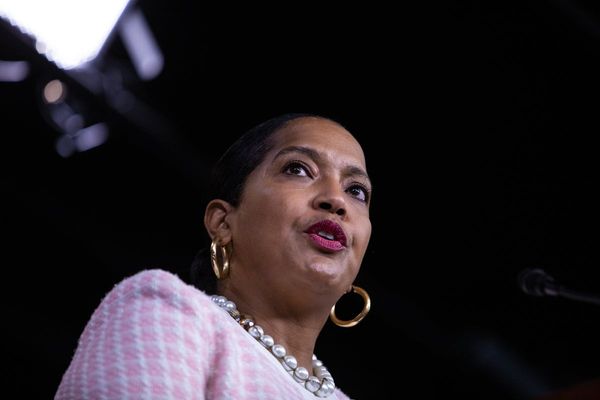
It’s a strange world that makes you yearn for the days of Ted Croker, Bert Millichip and Gordon McKeag. Football seemed so simple then. And to think that they once seemed absurd in their pomposity, with their velvet bag in the wood-panelled Football Association committee room at Lancaster Gate. The draw for the Champions League group stage, though, was something else, a festival of glitzy vapidity in which we had to be told over and over again how exciting it was that we were about to learn which pot-four side would be getting hammered by Manchester City.
And through the veneer of Euroschmaltz came the distinct sense of how broken is the competition. City’s triumph in Istanbul last season should have felt like the culmination of a great quest, but it was hard to conjure much sense of jeopardy when Internazionale were led by a 37-year-old forward City had binned off eight years earlier. It’s a paradox of excellence that hammering sides, as City did to RB Leipzig, Bayern Munich and Real Madrid, tends to diminish the sense of achievement.
The Champions League group stage arrives each year with a greater sense of weariness. That this will be its final season will be mourned only in as much as what replaces it will be worse. The problem, though, is not the structure, it’s the vast disparity of resources that sees Manchester United, with an annual wage bill of £191m, grouped with FC Copenhagen, wage bill £12.5m.
Underpinning that is the Premier League’s financial domination – and underpinning that is its embrace of free-market capitalism that allows, even encourages, states, even those with appalling human rights records, to take over clubs. Was football really given for this?
Given the UK government deals freely with Saudi Arabia and the UAE, why should football clubs be held to a higher standard? But the question surely ought to be, why shouldn’t they?
Statecraft is, of necessity, a grubby business. It cannot avoid compromise. The state must provide for the safety and security of its citizens and that means sometimes working with pretty reprehensible people. If we are to have food, if we are to have energy, if conflict is to be avoided and sufficient revenues generated to avoid excessive taxation, deals will have to be done with states with which we might prefer to have no dealings. Sport is not like that.
Sport can be purer. It can hold itself to higher ideals. When a government (not the one the UK has at the moment, obviously, but a proper government) speaks of alleviating suffering, it might be talking about poverty or injustice or years of terrorist bombing; when fans talk of it, they usually mean years of finishing 14th.
It is a weird failure of language that the word suffering is ever used of the feeling generated by poor results. Not being able to heat your home is suffering. Cowering as the bombers fly over your school is suffering. Being imprisoned and tortured is suffering. Going a few years without winning a cup is not.

Fans can be disappointed and frustrated, they can feel alienated by a hostile or incompetent owner, and they have every right to protest against that, but they very rarely suffer. Fans will always insist that they are not entitled, that their complaints are being misrepresented, that they don’t demand big signings or silverware, that all they want is dignity.
But how much dignity is there really in being the puppet of an authoritarian regime? And what is it but entitlement to believe, as some fans apparently do, that their not winning football matches legitimises the sort of deals governments must make to feed and clothe their people?
In 2014 the writer and broadcaster Michael Parkinson was asked on the Second Captains podcast why he thought sport was important. “It is not war and death and famine,” he replied, “it’s not that at all. It’s the opposite of that, it’s to persuade us there’s a world outside of that.”
Sport matters as a diversion from the daily grind and it matters in that it can confer a sense of belonging. It’s about escape and identity. It can be inspirational in reminding us about both the beauty and the resilience of which humanity is capable. But it matters most of all because it is ostensibly so trivial; it is precisely because it is not a matter of life and death that is gives us an opportunity to be our better selves.
When all that is at stake is the winning of a game rather than putting bread on the table, we can choose what we want to be. We can snatch at trophies and glory, whatever the cost, so blinded by tribalism that we regard racism, misogyny, homophobia, repression and misery as the unfortunate collateral in the rise of our football club – or, worse, seek to justify it.
Or we can stop, register what is going on, accept that our club has become an agent of this, and say no. Not at this price. Not in my name.
That doesn’t mean anyone has to abandon their club. The bonds of memory and identity are strong and important. It doesn’t mean anyone has to go and watch non-league football as some sort of purgative – although that is an option.
It doesn’t mean even asking how you might use that entity’s ownership of your club to highlight its faults. But it does mean being cognisant of the wider issues – not merely of human rights, although they are clearly the most significant aspect, but also of football governance and the disparities that undermine the Champions League.
And it also means stopping to ask, when you’re constantly having to create false equivalences and engage in whataboutery – yes, the British empire was also problematic, but it doesn’t own your football club right now – when you’re constantly having to come up with excuses to justify your support, who the bad guys really are.
Sport in its essential triviality is a chance to let fly the better angels of our nature. But too often they remain trapped by greed, by self-interest and by tribalism. Maybe that’s why sport is important: to show us what we are.







